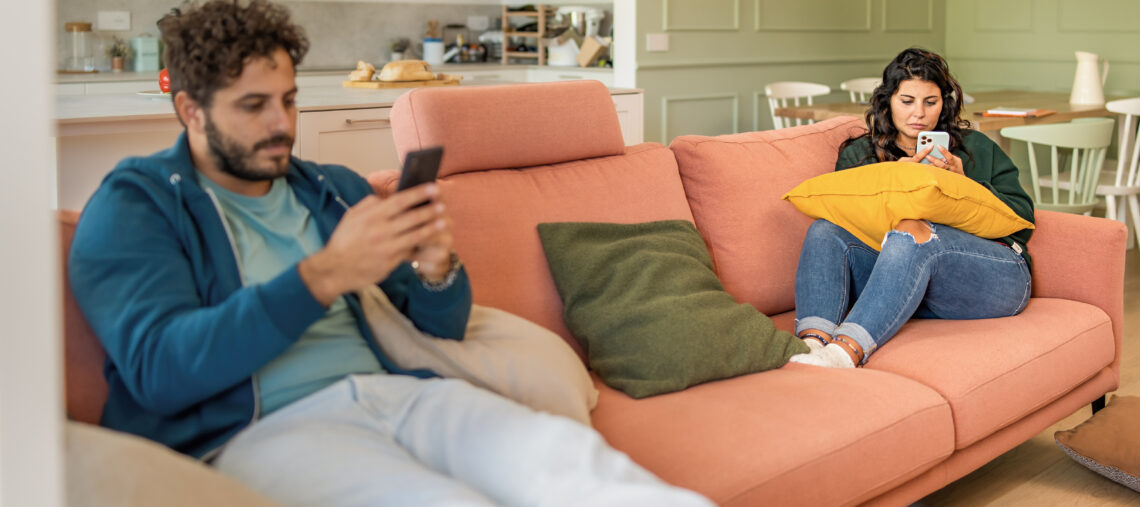
The next time you are sitting next to your partner and are tempted to look at your phone, turn towards your partner instead of a screen and have a conversation. Even if it is just a check in about how your day was, it can have a positive impact on your relationship.
Technology has come a long way in the last twenty years since my nightly phone calls while in university with my now husband. Many couples with partners traveling abroad for work or visiting and caring for sick relatives have a multitude of ways to stay connected.
But in many homes, technology use has become a barrier to connection and turning towards screens instead of each other can reduce relationship satisfaction and put you at risk for burnout.
The bad news is habits are often unconscious and thus we can mindlessly repeat unhealthy patterns until it’s too late. But the good news is, with awareness we can begin to create change. In this article we will explore common patterns and suggest ways to meet the needs together to increase your connection and overall happiness as a couple.
Six Reasons Why People Turn to Tech and How to Turn Towards Each Other Instead
1) Staying Up Too Late
The Need for Me Time
For many moms caring for infants and toddlers or juggling childcare and paid work, it can feel like the only time you have to yourself is after everyone goes to bed. But do you notice you end up feeling worse instead of better from ‘doom scrolling’, comparisons, mindless eating, forgetting what you researched and not getting enough sleep? Instead many moms find it more helpful to try getting up a little earlier if possible or carving out a few minutes throughout the day for more intentional self-care and tech time. This might require working on releasing unrealistic internalized expectations and talking with your partner about sharing more of the load.
2) Resentment
The Need for Shared Responsibility
It’s natural when we feel our partners pull away, to pull away further to protect against rejection but this only creates more distance and doesn’t address the underlying issues. Another unhelpful response is to personalize and get defensive which shuts down communication. Instead, if you notice your partner pulling away, use the Gottman Softened Start Up, focusing on what behaviors you observe. Use phrases like ‘I’ve noticed’, ‘It appears’ or ‘It seems lately.’ Talk about your feelings and not your thoughts. ‘I miss you. I can feel distance between us.’ Then get curious: ‘What’s up?, ‘What’s going on?’, or ‘What are you needing from me?’ Talk about how you can support each other and offer solutions you are prepared to implement. For more, check out my article ‘Create Lasting Equal Relationships‘ and the books ‘Fair Play’ by Eve Rodsky and ‘The Love Prescription’ by John and Julie Gottman.
3) Escape
The Need to Process Overwhelming Feelings
If you didn’t receive emotion coaching or develop secure attachment as a child, sharing your feelings may not come naturally. Talk to your partner about how you used things like video games or TV to cope during childhood. This can help your partner to not take it personally if you shut down.
If you’re not feeling comfortable sharing your feelings yet, maybe there are soothing things your partner can do for you such as sitting with you quietly or rubbing your back to help foster connection.
The Gottman Stress Reducing Conversation can be a great way to practice sharing with each other about stresses outside the relationship. Each person takes a turn being the speaker and the listener with the goal being validation and connection.
4) Pulling Away
The Need for Discerning Past from Present
Sometimes because of our attachment experiences, we can believe we are alone even when we have a supportive, available partner. Instead of turning to a screen, pick up a journal or notebook next time you pull away. Write down your beliefs, likely stemming from childhood and then note how it is different now. Take note of the way your partner has been there for you in the past while also holding space for the grief of your younger self. Validate and reclaim your need to be seen, heard, supported and know you matter. You might need to do this with a therapist.
Next, try sharing small things with your partner instead of pulling away to invite reparative experiences. Over time you can break the pattern and create a new story for yourself where you can welcome the love you deserve.
5) Staying Plugged in for Work
The Need for Better Boundaries
Do you have times and spaces in your home where there are no screens allowed? What about on dates? Create boundaries together and be transparent about when you might not be able to honor the boundaries such as if one of you is on call or has a tight deadline.
6) Boredom or Mindless Habit
The Need for Shared Activities
Sometimes people crave the dopamine that comes from playing video games or getting likes online but can lose sense of time, missing out on communication with their partner. A similar scenario happens when people mindlessly turning to their screens.
Instead of getting sucked in, try engaging in shared physical activities or playing competitive games to quell boredom and release endorphins.
Knowing the importance of physical activity for completing the stress response and improved emotional and mental health, my husband and I have shifted from watching TV to walking after dinner and go biking most weekends with or without our teens.
Think about what activities feel doable for you. What did you used to do when you were dating? Is there something you’ve been meaning to try?
More Resources for You and Your Partner
While I was writing this article, New York Times best selling authors of ” Sex Talks” Vanessa and Xander Marin recorded an episode of their podcast “Pillow Talks” all about phone use and setting healthy boundaries.
For an honest look into your screen use and guidance for modeling a healthy relationship with tech, check out my latest free guide.

